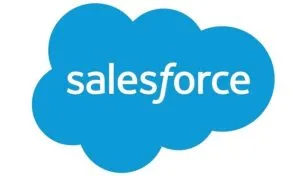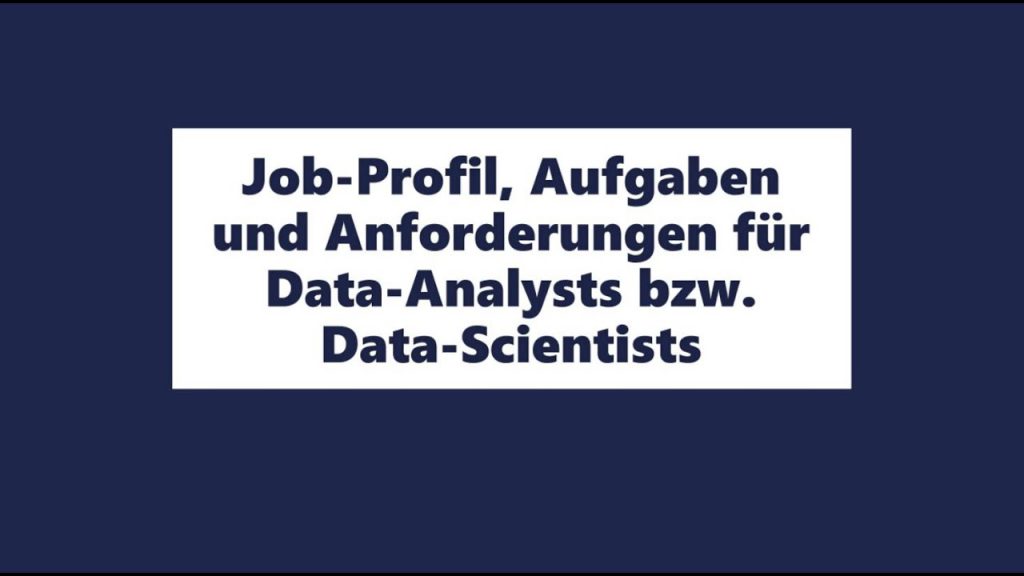The interview with Renate Hanke on the subject of Data Scientist, Data Engineer and Data Analyst, all important information summarized in one video.
Today’s topic: Job profile, tasks and requirements for data analysts and data scientists
What are the tasks and requirements for Data Analyst and Data Scientist?
A new exciting video with the speakers:
Renate Hanke
Managing Director at hbkPartner: https://hbkpartner.de/
and
Georg Blum
Managing Director of 1A Relations GmbH: https://www.1a-relations.com/
These interesting questions are answered in the video:
- What does a data analyst do?
- What is the difference between a data analyst and a data scientist?
- What requirements does a data analyst or a data scientist have to meet?
- What are the tasks of a data analyst?
- In which area do you need a data analyst or a data scientist?
- What are the salaries of a data analyst?
It’s worth taking a look 🙂
Tasks and Requirements for Data Analyst and Data Scientist
The following questions are discussed or answered:
- What skills characterize a data scientist?
- What does the everyday life of a data scientist look like?
- What know-how does he need in everyday life?
- What skills does the data scientist need to have for his position in the company? What skills does he learn on the job?
- In which areas, in which topics and at what point within the organizational structure is the data scientist used?
- What does the cooperation with the IT department look like?
- What conclusions does the management draw from the work of the data scientist?
What else is there on this topic “Tasks and Requirements for Data Analysts and Data Scientists” on www.crm-tech.world?
Scott Brinker has also written and discussed a detailed treatise on this topic. These can be read here and listened to or seen.
All in all, it is important for all companies with a turnover of 5 million euros or more to take care of their data or customer data. Whether you always do this with your own or borrowed staff, it doesn’t matter at the beginning. In the long run, it must become a core competence within the company. Then it also becomes a success factor. This is shown by the study results of the DDV in cooperation with the University of Kassel.
What does a data scientist do then?
This is what the colleagues from CIO.de and Computerwoche.de describe in an interview with Dr. Achim Strunk, Head of Digital Business QUADRA Energy, and Dr. Holger Clever, Managing Director of QUADRA Energy GmbH in Düsseldorf, a subsidiary of the ENERCON Group.
In a nutshell:
He uses the data to solve a company’s questions and problems.
So he prepares unstructured data into a know-how for the company.
Easy! Here is another explanation in English (whereby it really starts after about 1 minute).
Das ganze Interview als Text:
Georg Blum
So, dear Renate, that was our starting signal! I would like to welcome you to our little talk about Data Base CRM professionals, where we took a few minutes to discuss a few things. We also speak as part of the Digital Excellence Group. This is a cooperation of experts who dedicate themselves to the topic of digital transformation and can also help every customer as a cooperation partner to get the best out of specialists. And in this context, we said: Come on, let’s talk about this topic: “Looking for skilled workers, finding skilled workers accordingly”. Now maybe very briefly to you. Hbk is also a brand that has been on the market for some time. Can you say something very briefly to yourself and yourself?
Renate Hanke
With pleasure. So Renate Hanke, I am the founder and co-shareholder of Hbk Partner in Hamburg. We founded the company nine years ago, at that time with a different setting. Today, Ursula Steinmetz and I are the shareholders of the company and personnel consulting and we have specialized in the topics of sales, marketing and customer service. And this mainly for the industries in which both of us, you Georg, and we too, have been on the road for many years, namely everything around trade, mail order, all the services you need, such as marketing services, logistics services, financial services.
This is our field, we know our way around. That’s when we fill these corresponding specialists and managers.
Georg Blum
What I also enjoyed, I admit quite openly, is that we always play the balls to each other, where you say, maybe there is something in it with us. And the other day we were able to play you the ball again. In this respect, you have been able to make a nice conclusion. I believe that this is also the exciting thing about DEG, i.e. the Digital Excellence Group, that we can play the balls to each other and offer perfectly complementary services with your expertise.
And I myself have been in the CRM market, as it is called today, for 30 years. It used to be called data base marketing. I was first approached by a headhunter or a seeker in 1993. You also know Jan Thieme very well. And since then I have the feeling all these years after, it has never changed. The market is extremely close to such professionals. Is it so?
Renate Hanke
Absolutely, absolutely. So I myself started in the field 30 years ago, exactly in the topic we are talking about today, in the topic of data analytics. At that time, this was very closely understood by the trade and especially by the mail order business, customer structural analyses, location analyses in the direction. Today, everything is a bit broader. At that time, I also worked on this topic in terms of content, not as a statistician, but in sales, presentation and consulting for customers. What can you do with the findings? So similar to you.
Georg Blum
That is why, for me, the topic is why we are also talking here today. The market is very, very, very difficult to find the right and suitable people. And you have only recently found someone for us, for one of our customers. There were, I think, nine candidates. If you just think about it, what is the data analyst at the moment? Which we have occupied there. What is such a typical profile? What is most people looking for?
Renate Hanke
Yes, what I just said at the beginning, we have both philosophized about what is a difference between data scientist and data analyst. In the meantime, I have made myself smart, there are also various other names in the field of data. If you look at the definitions, the difference is not that big. They are people who collect, structure data, build analysis models on it, carry out analyses, then implement the findings in understandable reports and dashboards and, above all, are available to their colleagues and superiors in order to explain the whole thing.
What insights have we now gained from this? That’s what they both do. But the special thing that we both see now with the Data Analyst, why we called it that or why the customer called it that? We come from the address-related analysis environment and the data scientist, which we have learned very well in the course of the search, the data scientist often has nothing to do with addresses. This means that it usually starts with structuring the addresses in the first place or they have to be structured. Then the typical management tasks have to be fulfilled, duplicate check, correct spelling, comparison against relevant databases, so that these addresses can be used at all. This is the first task that such a data analyst has to do in the field of trade/mail order, i.e. also financial services or insurance, where personal analyses are involved. The next thing to do is to think: This data that we have from sales, from marketing, from purchasing, finance and so on, from complete logistics, what insights can we gain from them? The goal behind it is always to optimize the business and sell more.
Georg Blum
My former boss once said: “Mr. Blum, if you bring me a million in sales, then I’ll be happy to hire someone there again.” And that’s exactly how you say, so it’s about generating sales or working out contribution margin accordingly. That was the fun for me at the time. And probably also with you and that is also the task of these people today.
Renate Hanke
Exactly, so that’s essentially the job description, the tasks that are pending. And that’s why it’s usually mathematicians, statisticians, i.e. people who have completed a degree, who are being sought. It can also be computer scientists, it can also be business informatics or business administration with a special orientation. There’s a variety of basic training, I say, and then people develop with it depending on their inclination.
Georg Blum
I used to have a colleague and that’s why, I think, this is also a field of training where you have certainly already found one or the other, namely in the social sciences or in the agricultural sciences. So we got to know many, many people who studied agricultural sciences at the University of Hohenheim, for example, and usually did an empirical study somehow. And then you had to know and be able to know a bit of statistics and with such expertise we recruited one or the other to the data base or even today to the data analyst accordingly. So I also think that such vocational training courses are a very exciting way to find people.
Renate Hanke
Sure, of course. So as I said, the education is very diverse.
Georg Blum
That’s how I spoke to Scott Brinker in America at our Boston conference. I myself also think they are people who should think more generalistically. So these are not the classic “number servants” that you supposedly provide for this in the first place, but they are people who can also make interpretations with the numbers, as you said earlier. In order to bring transparency to the management, the division manager, I’m not saying to explain, in the sense of what they should do better, but to bring transparency and to say: “Ok, that’s a basis for decision-making in the direction or maybe you should test it in the direction.” So that’s why I think they’re very creative people. Is that right?
Renate Hanke
Absolutely, absolutely. And they also have to be able and willing and have fun thinking again and again: What can we get out of these data pots that we have? So the classical analyses are, of course, socio-demographic. What do I have for sex accumulations, what do I have for age accumulation. But also the so-called RFMR. So these purchase frequency, frequency monetary ratio analyses, so which customer bought when, how much with which turnover? These are the classic analyses that are necessary for our customers. Then all the marketing topics are added. The advertising success control via the various channels. That has become very, very important. So MarTech has just become a huge discipline. In the past, marketing was mainly thought of colorful images, let’s always say text, communication. But today it is very strong and many analysts are being sought. This pricing topic, the dynamic control of online ads, everywhere there is a lot of data. Today we also talk about this big data approach, because there is a lot going on in this customer group, for some companies it is 10,000, for some 100, for some millions, yes, but these are not yet the big pots. Then there are all the topics such as location analyses or the topic of availability, availability of goods in logistics, in production. Again, this is a field of its own.
Georg Blum
You are addressing a very exciting topic. I’m not allowed to communicate it quite so loudly, because it is still a company that exists on the market, which is why it may also exist. But at a retail company with CRM and assortment data, we managed to reduce the purchasing volume by 20 percent without losing sales. That was a little while ago, this story, but the company that was then, it was around the year 2000 / 2001, a trading company. We and our team were able to do really great things and as you say: RFMR was the entry, but just then in combination with assortment starts, category management, such things played a big role. So it’s also such a playing field where I say there’s a lot of potential for these employees that we’re discussing right now. And if someone, one or the one, is in the mood for it, and I think that’s really a wide field where you can really cultivate something. Before our telco, I had an appointment with a provider who is active in the social media sector. Makes do digital ads control, social media posts, social listening. There is also an insane amount of data and also there is, I believe, now still a huge field, because in the vast majority of cases click count, posting number is analyzed, but you can also analyze a whole lot of conversions, just prepare for this lead success rate, as it may end afterwards in the CRM. I think this is also an insane field, first to prepare the data and then to bring it to success, to a success indicator.
Renate Hanke
So two points on that. There is, he is also sought after a lot, the so-called Lead Generation Manager. Sure, because we all need leads to be able to sell. For whatever reason. Offline. Online. As a rule, they also have a good knowledge of data analytics, according to the figures. They need the KPIs, even the key performance indicators, to see when I approach people now, what is the probability that they will become customers and what sales are hidden behind it? The next one is a very wide field, Georg, at the moment is payment and fraud prevention and insurance defaults, defaults, analyses, regulations to determine if I sell to the customer now with a lead, how likely is it that I will get my money? Not usually calculated on a single case, but then bundled. But around payment, which at the moment, we know, is again a very big topic, because payment is moving from cash and transfer to online.
Very, very many data analytics people are needed. As I said, some of them call themselves data scientists. Have to take a look, there are two other interesting terms that I learned there, but which I did not know before: The Data Engineer e.g.
Georg Blum
Yes, this is the Data Engineer. This is, so to speak, the European version of Scott Brinker’s definition. He has also set up a few things for himself. In this respect, these are often the people who prepare and prepare all the data, who work all the interfaces, define them. Nowadays, with the large amount of products that are usually in use, this is also a very, very important field. I wanted to make one last point before we get to the topic: What do such people cost, what are they allowed to get? So my brother always says, what do you earn in a positive sense. What can they ask for? I wanted to make one more point, because you brought payment, the topic of returns is also a very important topic. So who is a potential returner? Who orders five items and sends four back? This is also such a classic, a classic topic in the mail order industry or in the eCommerce industry at all. So that’s why, we’ve seen it, I think I’ve been talking for seven or eight minutes about various fields of action. Yes, and we could probably talk again for a whole hour from this keyword list. What is available in detail, i.e. from RFMR to assortment to category, to fraud, to risk, to returns, to segmentation. So it’s a great field, I always found it. And that’s why the question now is these egg-laying woolly milk sows, as I call it now, which are a bit creative, a bit analytical, a bit communicative, a bit procedural.
What is the starting wage that you have to pay and in what range is it? What are the three to four years of professional experience? What is to be expected? What? What can someone ask for?
Renate Hanke
Yes, so first a small add-on. So in addition to what you have just mentioned, what humans must be able to do, they should usually also be able to use one or two programming languages in order to be able to program queries themselves. Not the deep knowledge, but yes and statistical methods you have to have on it, so to be able to do anything at all. Thus, the starting salaries, Georg, are about 45 / 50,000 per year salary / annual target salary. As I said, we are talking about people who then bring a course of study with them. With Master and Bachelor difference, one speaks of 50,000 euros annual starting salary. And then it goes on. After our experience with 5 to 10 years of professional experience, we then arrived at 70/80 000. Now the big difference is, when we are in retail and mail order, we move approximately in terms of salaries. But let’s take a look at the many consulting companies, i.e. the service providers who offer data analytics in some form. We also need the consulting expertise, even more pronounced than the communicative side, which people have to bring with them anyway, which is something more. There are data analysts at the relevant large management consultancies. They are then on the road all week, like any consultant. And these are quite 85 /90,000 must then have even more professional experience or also have leadership experience. Then we are quickly over 100,000. But the large mass, we estimate, is about 70/85 000.
Georg Blum
If we are asked, how many people does a company need? So I always tell the company that takes such a step, gets someone like that or someone trains in that direction. But now we are on the topic of fetching and organizing, for example, through you. Then you should already have two people, because if one has a vacation, it is the topic that you have someone who can represent the whole thing as an additional person. And on the other hand, if you have now defined these salary levels, I say with ancillary costs 200/ 250 000 euros for two people. Maybe a senior, a junior. The boys and girls get that in very quickly, once they are trained. And there is still a lot of room for manoeuvre in terms of sales and contribution margin gain. I think we are both quite sure of that. So this is shown in practice, it is worthwhile to hire two people for it.
Renate Hanke
Yes, I’ll say so in the e-commerce and mail order business that we know so well. So the bigger providers. I’m not talking about Zalando now. I am also talking about medium-sized btb providers, i.e. those who are active in office equipment or packaging. As a rule, they also have a small team, of course like to work together then these people in a team with appropriate IT specialists.
Georg Blum
Well, then we come to the end, Renate, so I think we have shown what an exciting field of activity is here. We have shown in what order of magnitude there is either something to pay from the point of view of the companies, from the point of view of the applicant of course also to earn. And I think that’s rightly a decent level. And if you are now or if a company is thinking about making itself smart, how should it contact you, what questions do you ask so that you get really good search profiles? That would be my final question.
Renate Hanke
So getting in touch is very easy: hbkartner.de can be found on the Internet. Nor are we unknown in this industry in what we have just described. And yes, what we need is, of course, we clearly coordinate the profile with the searching company. I have just said it. It is very, very important to know what should man do? In which environment does he get in? What requirements does he have to meet, is 3-5 years of professional experience sufficient? Does he really have to have a good command of English? Maybe another language? Because this company also operates in other countries with colleagues? Yes, you always have to be careful. Then, of course, these topics such as in which databases does he have to be familiar? Is it about Etl processes, SQL tables and Navision and what is usually used? We have to clarify all this in order to be able to search concretely. That’s where the whole field separates. Some are on these tools, software and applications and others are on the move. That’s what we learned again just recently in the search you described. So it’s Data Analyst on it. But it might be a data engineer or a data.
Georg Blum
Well, but it’s like any briefing. The more precise the briefing and the more accurate the briefing, the more accurate you can of course search in your pool or in the network and the faster and more successful the search will ultimately be.
Renate Hanke
Yes, exactly. So again summarized the tasks, the environment, the requirements that the person must bring and of course the company should think about it. But we are happy to provide advice on this, in what salary range is the whole thing allowed to move, should the whole thing move? Usually we are called the sporting challenge. So in other words, we will be given smaller salaries than will be paid afterwards. But this is perfectly legitimate. So I would send the service provider first and say: See if you don’t find it. That’s perfectly fine.
Georg Blum
That’s exactly what such a nice final word is. In the beginning, the hurdles are a bit higher or the threshold a bit lower. In case of doubt, it will be a bit more expensive. But what from my point of view, and I think this is very, very important, is worthwhile, because this investment, these people data scientist, data analyst or engineers or MarTech specialists is a professional field, which is far from exhausted. And as I said, you and your colleague Ulla Steinmetz, you are specialists in research.
Renate Hanke
I would like to say one more thing, so of course it is not only Ursula and I here, there are six of us and we then have a few employees who support us freely. So we can already produce a bit higher stroke rate. I don’t know, dear Georg, whether there is a continuation to other job profiles that are currently being sought. But of course we are not only active for the MarTech industry, but, as I have already said, everything that has to be filled around sales, marketing, customer service, very special specialist and above all management positions, that is our field.
Georg Blum
Well, you can’t get a better final word now. In this respect, I would like to say “thank you” at this point and, dear Renate, you have already indicated that I am sure that in the next two or three weeks, both of us and with Kathrin, we will have another session on these topics. Technical side on the one hand. But how? On the other hand, how do I find the right people? How do I train them, what do I have to consider? We do that, but elsewhere. Therefore, thank you very much for today and I believe in our viewers again. A big thank you! And if you have any questions, the Renate can be found at – will you say it again? Website is:
Renate Hanke
HBKpartner.de wonderful. So in that sense. Thanks.
Georg Blum
Get in touch and I thank you again and all the best and see you soon.
Renate Hanke
See you soon bye.
Georg Blum
Goodbye.
Industry 4.0 – Artificial Intelligence
Data science specialists are also important in the field of AI (artificial intelligence), because this is exactly where big data analyses are very important, as well as deep learning and machine learning.
Note: This is a machine translation. It is neither 100% complete nor 100% correct. We can therefore not guarantee the result.










 CAS Software AG ist Marktführer für Kundenbeziehungsmanagement (CRM) im deutschen Mittelstand. Ob Marketing, Vertrieb oder Service – Anwender profitieren von effizienten Prozessen auf einer einheitlichen Datenbasis.
CAS Software AG ist Marktführer für Kundenbeziehungsmanagement (CRM) im deutschen Mittelstand. Ob Marketing, Vertrieb oder Service – Anwender profitieren von effizienten Prozessen auf einer einheitlichen Datenbasis.





